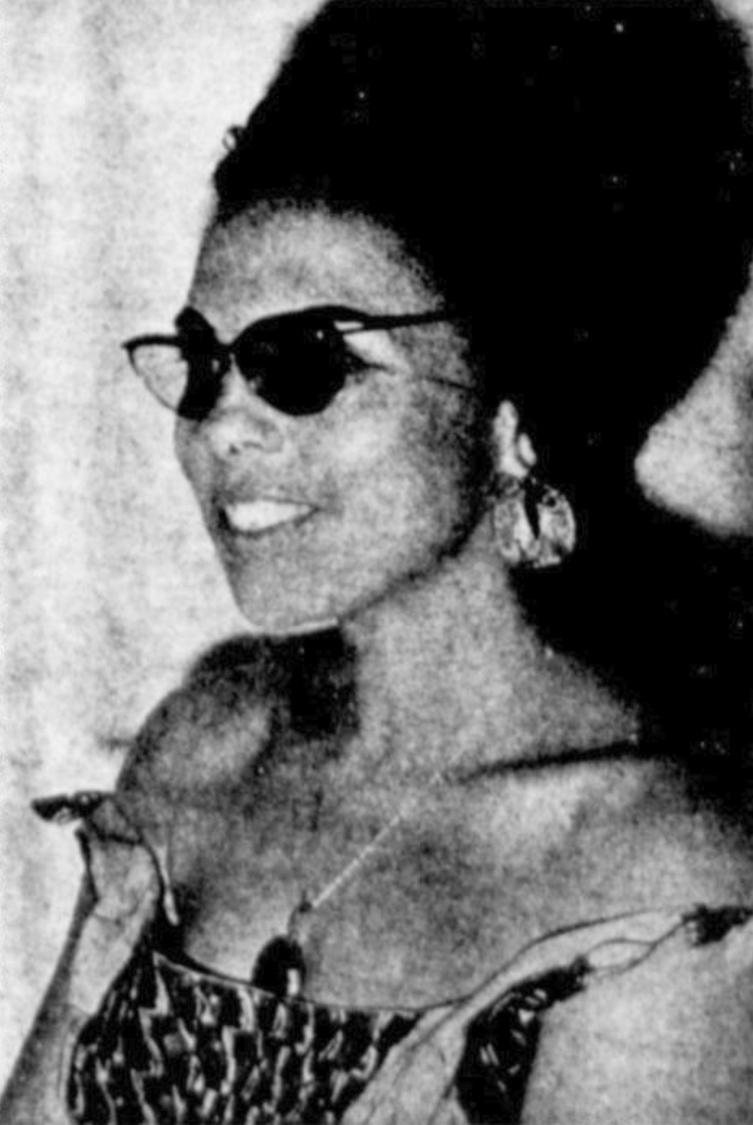Andree Madeleine Blouin, one of an emerging group of African activists and political leaders in the 1960s, was born in Bessou in the French Colony of Ubangi-Shari (today’s Central African Republic) on December 16, 1921. Her mother, Josephine Wouassemba, was a 14 year old Banzi girl. Her father, Pierre Gerbillat, was a 41-year-old French businessman.
Blouin’s early years were spent with her mother, but at the age of three, her father sent her to a Roman Catholic orphanage in Brazzaville, French Congo primarily designed to house children of mixed-race parentage. At the orphanage she was subjected to abuse and neglect. At the age of 15 she fled the orphanage to defy an arranged marriage.
At age 17 Blouin had a child with a French aristocrat in Brazzaville. The relationship did not last and a few years later she married Charles Greutz a French businessman. They lived in Bangui, Ubangi-Shari. Their son, Rene, was born there.
In 1946 at age 2, Rene was diagnosed with an acute case of malaria. At the time in French African colonies, it was unlawful for an African (or person of African descent) to have access to anti-malaria medication. Andree begged the colonial governor to allow her child to receive the life-saving medication. Even though her son was only one-fourth African, her appeal was denied and her son, Rene, died shortly thereafter. Andree later wrote, “The death of my son politized me.” Her marriage soon ended. In 1952 Andree married, Andre Blouin, a French mining engineer. They relocated to French Guinea in West Africa.
In 1957 the British west African colony of the Gold Coast became the independent nation of Ghana. Demands for independence were voiced throughout the French and British African colonies. In French Guinea, Sekou Touré and his political party championed complete independence from France. Blouin became involved in the agitation for the end of colonial rule in Guinea and joined Touré’s entourage that toured French Guinea advocating for independence. She emerged as a noted political organizer for Touré and his pro-independence party, often speaking at his rallies encouraging women to join the fight for independence by joining the women’s wing of the party. In 1958 Guineans voted for independence.
In 1960 Blouin met several young leaders of the independence movement in the Belgian Congo and soon became became involved in the agitation for that colony’s independence. She organized and mobilized women for the Congolese independence drive. A dynamic, charismatic, and well-organized speaker, by May, 1960 she had singlehandedly enrolled 45,000 people into the Congolese Independence Party. She headed the women’s wing of the party where she worked to expand literacy, fight alcoholism, and for women’s and children’s rights.
After Congolese independence on June 30, 1960 Blouin served as President Patrice Lumumba’s Chief of Protocol in the new government. Her position included being a speechwriter and serving as a diplomatic liaison to European governments. Soon after independence Lumumba’s government was overthrown in an army coup led by Joseph Mobutu. Blouin was sentenced to death but was able to flee the country. In the Western press Blouin was portrayed as an “extreme” nationalist, a communist and a courtesan of powerful African politicians. Others criticized her for teaching women to revolt against their husbands and traditional roles in African society.
After fleeing the Congo, she and her husband settled in Algiers, Algeria. In 1973 the couple divorced and Blouin relocated to Paris. She lived quietly in Paris until her death on April 9, 1986 at the age of 64. She continued to offer support to African nationalists until her death. In addition to Rene, Andree was the mother of three other children.

